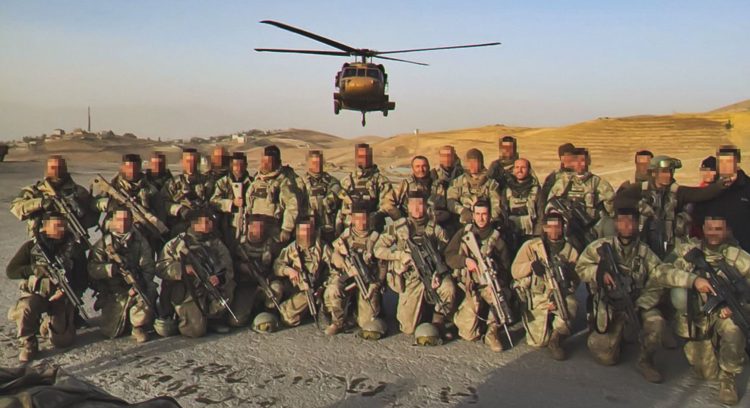This rigorous and exhaustive process ensures that only the most capable, disciplined, and resilient individuals earn the coveted Maroon Beret, fully prepared for the challenging and complex missions of the Turkish Special Forces Command.
Operational Engagements
The ÖKK has been instrumental in various military operations, both domestically and internationally. Key engagements include:
Kurdish–Turkish Conflict (1978–present): The ÖKK has played a crucial role in counter-insurgency operations against the PKK, employing unconventional warfare tactics to neutralize threats.
Operations in Northern Iraq: Throughout the 1990s and 2000s, the ÖKK conducted cross-border operations, such as Operation Steel (1995) and Operation Hammer (1997), targeting PKK strongholds.
Syrian Civil War Involvement: The ÖKK participated in operations like Operation Euphrates Shield and Operation Olive Branch, aiming to secure Turkey’s southern borders and combat terrorist organizations.
2016 Turkish Coup Attempt: During the failed coup, the ÖKK, under the command of then-Major General Zekai Aksakallı, played a pivotal role in thwarting the uprising, demonstrating loyalty to the democratic order.
Notable Commanders
Leadership within the ÖKK has been marked by distinguished figures, including:
Major General Zekai Aksakallı: Served as the commander during the 2016 coup attempt and led operations in Syria, notably Operation Euphrates Shield.
Major General Ömer Ertuğrul Erbakan: Appointed as the commander in 2019, he continues to lead the ÖKK in various strategic operations.
International Collaboration
The ÖKK has actively participated in various international collaborations, enhancing its operational effectiveness and fostering partnerships with allied nations. As a NATO member, Turkey contributes to missions like Operation Sea Guardian, which focuses on maritime security and counter-terrorism in the Mediterranean. In this capacity, Turkish Maritime Special Operations Forces have conducted joint exercises under NATO command, showcasing their ability to work seamlessly alongside allied forces.
They regularly engage in joint training exercises with other countries to improve interoperability and tactical skills. These exercises often simulate counter-terrorism operations, special reconnaissance, and urban warfare scenarios. Additionally, the Turkish Special Forces have collaborated extensively with U.S. Special Operations Forces through joint training programs aimed at improving tactical proficiency and exchanging best practices.
In regional counter-terrorism initiatives, the ÖKK has shared its operational expertise with partner nations, particularly in efforts to combat groups like ISIS and the PKK. The Turkish Special Forces have also supported allied forces in Iraq and Syria by training local troops and conducting direct action missions against terrorist organizations, contributing significantly to regional security.
Beyond operational collaboration, Turkey has pursued defense industry partnerships with various countries, enhancing its military capabilities through co-production and technology transfer agreements. These initiatives strengthen the overall defense posture of the Turkish Armed Forces, including the ÖKK.
Through these international collaborations, the Turkish Special Forces Command continues to refine its capabilities while playing a vital role in promoting regional stability and global security.
Distinctive Units
The ÖKK is made up of several highly specialized units, each with distinct roles and capabilities that contribute to Turkey’s national defense. At the forefront is the Bordo Bereliler or “Maroon Berets,” the most well-known unit within the ÖKK. Established in 1952, these elite soldiers are trained to handle high-risk missions such as direct action, counter-terrorism, and intelligence gathering. Known for their resilience and operational effectiveness, the Maroon Berets gained international recognition for capturing PKK leader Abdullah Öcalan in 1999.
The Combat Search and Rescue (MAK) unit specializes in recovering personnel from hostile environments, often operating under extreme conditions. Equipped for both land and maritime missions, MAK is highly skilled in using advanced techniques and equipment to ensure successful rescues. Complementing these efforts is the Special Aviation Group, which provides crucial aerial support for special operations. This unit operates helicopters capable of night missions and is vital for rapid deployment and extraction.
For maritime operations, the OKK relies on two units: the Underwater Offensive Group Command (SAT) and the Underwater Defense Group Command (SAS). The SAT, similar to the U.S. Navy SEALs, focuses on offensive missions like reconnaissance, sabotage, and combating maritime threats. Members are trained in combat diving and underwater demolitions for covert aquatic operations. On the other hand, the SAS specializes in defensive underwater tasks, protecting Turkey’s maritime interests against potential threats and sabotage.
The Gendarmerie Special Operations Command (Jandarma Özel Harekat) operates as a paramilitary unit specializing in counter-terrorism and high-risk law enforcement missions. Often collaborating with the OKK, this unit focuses on addressing terrorist activities within Turkey. Additionally, the Natural Disaster Search and Rescue Unit demonstrates the OKK’s versatility. While primarily dedicated to humanitarian efforts, this unit is trained to respond to natural disasters both in Turkey and abroad.
These specialized units, with their rigorous training and unique capabilities, enable the Turkish Special Forces Command to tackle a wide range of challenges, from counter-terrorism and rescue missions to maritime defense and humanitarian aid. Together, they form a comprehensive and adaptable force critical to Turkey’s national defense.
Summing Up
The Turkish Special Forces Command embodies a legacy of excellence, adaptability, and unwavering commitment to national security. Its evolution from post-World War II structures to a modern, elite force reflects Turkey’s strategic emphasis on unconventional warfare capabilities. As regional dynamics continue to evolve, the ÖKK remains a critical component of Turkey’s defense apparatus, prepared to address emerging threats with precision and professionalism.










COMMENTS